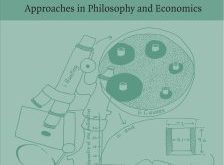Why DSGE models are worse than useless The unsellability of DSGE models — private-sector firms do not pay lots of money to use DSGE models — is one strong argument against DSGE. But it is not the most damning critique of it. The most damning critiques that can be levelled against DSGE models are the following two: (1) DSGE models are unable to explain involuntary unemployment In the basic DSGE models the labour market is always cleared – responding to a...
Read More »Explanation — not a question of simply adding nodes to a causal model
Explanation — not a question of simply adding nodes to a causal model If we do not fully explain by adding more variables, how do we explain? Mechanisms explain because they embody an invariant property. The first mechanism, linking the gas pedal to the rotating drivetrain, is combustion: The second mechanism, linking the rotating drivetrain to acceleration, is the relationship of torque to force. Combustion is a high energy-initiated, exothermic...
Read More »Vladimir Kara-Murza and the reckoning that will come
Vladimir Kara-Murza and the reckoning that will come In science, courage is to follow the motto of enlightenment and Kant’s dictum — Sapere Aude! To use your own understanding, having the courage to think for yourself and question ‘received opinion,’ authority, or orthodoxy. In our daily lives, courage is the capability to confront fear, as when in front of the powerful and mighty, not to step back, but stand up for one’s right not to be humiliated or...
Read More »Some pitfalls of using randomization and instrumental variables
Some pitfalls of using randomization and instrumental variables .[embedded content] Great presentation, but I think Angrist should have also mentioned that although ‘ideally controlled experiments’ may tell us with certainty what causes what effects, this is so only when given the right ‘closures.’ Making appropriate extrapolations from — ideal, accidental, natural or quasi — experiments to different settings, populations or target systems, is not easy. “It...
Read More »Knowledge and the crisis in teacher education
Knowledge and the crisis in teacher education In Sweden, the standard of living measured by per capita income has increased by a factor of over 50 since the mid-1800s. Overall, people in the Western world today are more than twenty times richer than they were a century and a half ago. Its population has a life expectancy that is almost twice as high as its ancestors. What has caused this increase in prosperity and living standards? At the same time, why do...
Read More »Model vs reality
Modelling by the construction of analogue economies is a widespread technique in economic theory nowadays … As Lucas urges, the important point about analogue economies is that everything is known about them … and within them the propositions we are interested in ‘can be formulated rigorously and shown to be valid’ … For these constructed economies, our views about what will happen are ‘statements of verifiable fact.’ The method of verification is deduction … We are, however,...
Read More »Song for Guy
.[embedded content] As I was writing this song one Sunday, I imagined myself floating into space and looking down at my own body. I was imagining myself dying. Morbidly obsessed with these thoughts, I wrote this song about death. The next day I was told that Guy [Burchett], our 17-year-old messenger boy, had been tragically killed on his motorcycle the day before. Guy died on the day I wrote this song.
Read More »Oxygen music
.[embedded content]
Read More »The limits of DAG formalism
The limits of DAG formalism There are good reasons to think that moderating causes have an important role general in explaining development and growth. Why? The growth process is apparently strongly affected by what economists call complementarities. Complementarities exist when the action of an agent or the existence of practice affects the marginal benefit to another agent taking an action or to the marginal benefit of another practice. Education is...
Read More »Normative multiculturalism and the paradox of tolerance
Normative multiculturalism and the paradox of tolerance Culture, identity, ethnicity, gender, and religiosity should never be accepted as a basis for intolerance in political and civic aspects. In a modern democratic society, people belonging to these different groups must be able to rely on society to protect them against the abuses of intolerance. All citizens must have the freedom and right to question and leave their own group. Against those who do not...
Read More » Lars P. Syll
Lars P. Syll





